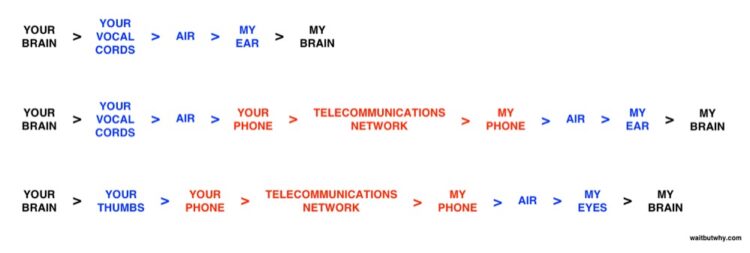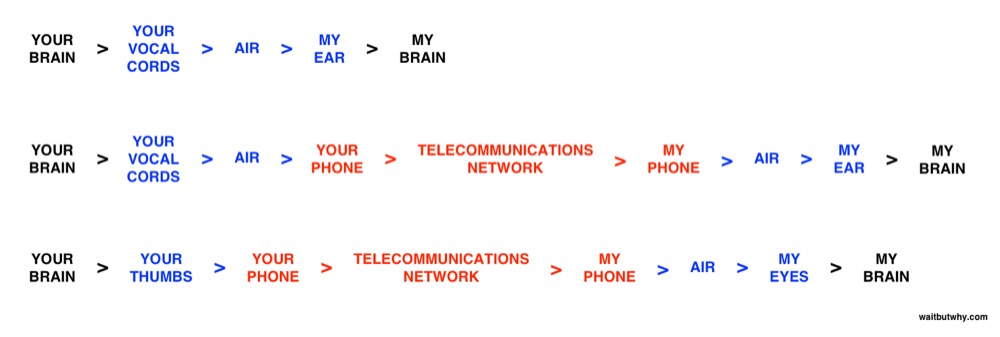Importation vs. Implication Neuralink and Media
If every venture of his works out, Elon Musk’s neuralink will be the most significant contribution to his legacy. If Tesla works out, there’s no doubting we can, in all of our ingenuity, find some new resource bottleneck and other ways to pollute the ecology. If Space X takes off, humanity will undergo another age of exploration. But with neuralink, the very subjects exploring space will be something beyond homo sapiens and they will experience a new journey in emotions and reflections, something our apish minds can’t begin to fathom.
Neuralink, for the unacquainted, will be a brain implant allowing us to interface with computers. Soon, this will enable mass adoption of existing technology to interface with prosthetics, smartphones, or any other computer.
In the long term, however, neuralink promises to export consciousness into robotic bodies, each other’s minds, immersive virtual reality, and numerous technologies we can’t foresee. Unpairing consciousness from the body, neuralink, in essence, promises to be the vehicle towards transhumanism.
In this respect, proper appreciation for the subject is strangely lacking. While Slavoj Zizek has had some great lectures, Tim Urban and Elon Musk’s book, “Neuralink and the Brain’s Magical Future,” argues that this is simply another step of cyborg evolution. We already have Google, iPhones, and instant knowledge. If we already enjoy computers in our pocket on what principle should we oppose plugging it into our brains?
This post’s humble goal is to establish that the Rubicon hasn’t been crossed and understanding neuralink as something qualitatively new illustrates the stakes at play. This is not another iPhone but something fundamentally different in humanity.
Traditional media is limited to implication past a screen of our own subjectivity. Neuralink’s importation of experience bypasses it.
This isn’t ‘like another smartphone’ — Implication vs. Importation
Media implicates ideas, while neuralink offers a direct importation. The former mediates information, and the latter gives a total account.
Consider the example Musk himself gives of sexual experience with neuralink. This wouldn’t be masturbating at a screen, but the literal embodiment of an avatar’s body, thoughts, and senses during a peak experience. Taken seriously, neuralink offers a complete immersion of the sensory and internal worlds, leaving only a sliver of self-consciousness that we are in simulacrum.
On the other hand, consider the etymology at play in media. ‘Media’ stems from ‘medium’ and is related to ‘mediation’. Thus, media provides a shuttle from the idea to the receiver.
In this metaphorical shuttle, however, the idea will ultimately be altered based on description, receptivity of the audience, and its integrity at large. For example, any book, movie, or other medium will always lead to different interpretations due to media’s imperfection.
This all may sound obvious, but it’s at the core of what Urban and Musk misunderstand. Consider the graph from Urban’s blog:
While the top three chains represent traditional media, the bottom is neuralink communication. Neuralink is argued as simply another media form because it cuts out all the intermediate steps like ‘my phone’ or ‘air’.
The glaring omission is any mention of subjectivity. To return to Musk’s example: retelling a sexual experience would likewise have to undergo this decay without neuralink. If he simply told me about it, the integrity of Musk’s original experience would be affected by factors including: how he describes it, whether I’m paying attention, what mood I’m in, or how—even as he describes it—I’d likely compare it to my own memories as a sort of competition. On the shuttle between the idea to the audience, media is necessarily influenced by subjectivity.
Ending subjectivity indicates that neuralink is something qualitatively new. We’re not ‘already cyborgs’ nor has any rubicon been crossed. At risk is the functional end of subjective interpretation and flirting with drastically different stakes.
Autonomy
What would seem most at risk is a cohesive self-conception. If virtual experience and communication become as compelling as our own thoughts, a self’s integrity would be vulnerable from every front.
According to Slavoj Zizek, a particular government agency already has a working implant like neuralink. From a computer, this agency commanded a test subject to simply walk across the room. The kicker is that the subject perceived the agency’s command as their own free will. They couldn’t distinguish between their own will and the implant’s.
This actually shouldn’t surprise us. When a computer is compromised, it isn’t aware of being ‘hacked’, but simply acts on bizarre programmed commands we know, from the outside, are unusual. But if our thoughts are likewise electrical impulses, what will help us discern between our own will versus an implant’s?
This actually shouldn’t surprise us. When a computer is compromised, it isn’t aware of being ‘hacked’, but simply acts on bizarre programmed commands we know, from the outside, are unusual. But if our thoughts are likewise electrical impulses, what will help us discern between our own will versus an implant’s?
Musk says people will only access our brains if we ‘will it’. Zizek suggests: how do we know if we’re being hacked? Who will watch us? If Facebook can lie about privacy, who will keep the neuralink companies accountable?
Opt-Out
Consider even the more banal cases, however. With video games, we’re already seeing kids opt- out from socializing, athletics, and school. With pornography, we’re already seeing more people lack the will power to go on a date. These relatively crude media forms have already allowed people to absorb themselves in a private, over-stimulating universe.
Neuralink will exacerbate this as creatives work on an interior immersion. Neuralink offers the ability to construct a character’s internal world of memory, thought patterns, and artificial self- consciousness. Gamers could have a character’s entire backstory simply encoded into them. Pornographers could simply encode years of foreplay into the avatar’s memory. The artists will be unable to go one step further in rendering full immersion.
All of this points to the demotion of reality into ‘another experience’.
Something qualitatively new
Urban and Musk’s argument seems to be a rhetorical quirk in tech at large. Through bizarre sort of progressive-No True Scotsmen fallacy, tech has a double step of saying their innovation is ‘another…’ and then demonizing the critics as Luddites.
AI apologists, for example, seriously argue their product as just another stage in economic growth. AI is argued as ‘more machines’ that dramatically improved living standards in the agricultural and industrial epochs. Nobody would argue against dramatic improvements in living standards, would they? Thus, the opposition is apparently annihilated as ‘Luddites’.
This particular argument, however, overlooks that our preparation for the qualitatively new industrial revolution was flawed. We are still addressing ruined ecologies, inhumane industrial meat, and a parasitical Wall Street class that began in the industrial revolution. Not considering that the industrial revolution was something qualitatively new, we’ve been forced to address its issues retroactively.
Musk says that controlling the speed limit of our cognition is in our fingers. Improving our ability to process information will undoubtedly have some upsides for humanism in the future.
On the other hand, let’s not kid ourselves about the stakes. Skepticism over something like AI or neuralink being argued as ‘another…’ isn’t Luddism; it stems from the humble suggestion that innovation brings inevitable trade-offs and possible disasters.
In the case of neuralink, it will undoubtedly relate to our self-conception as a species and the more we treat it as a unique event in history the more we’ll be prepared for when it actually arrives.




